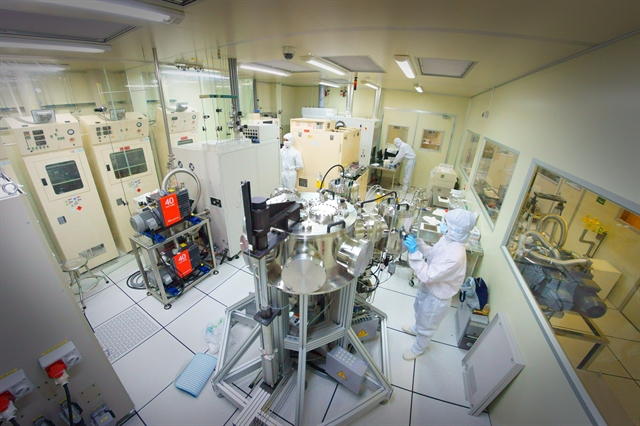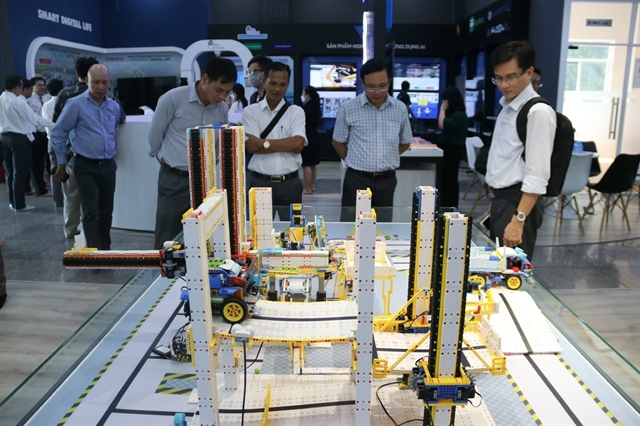 |
| The modern laboratory for Nanotechnology research at Việt Nam National University-HCM City. — Photo courtesy of VNU-HCM |
HCM CITY — Many higher education institutions in Việt Nam are promoting investment in scientific research as one of their key tasks, but there are still certain difficulties in implementing policies that promote research.
Huỳnh Thành Đạt, Minister of Science and Technology (MoST), has recently emphasised the important role of scientific research activities in universities.
The Prime Minister urged the MoST to coordinate with relevant agencies develop a report that analyses issues that need to be addressed to promote scientific and technological development.
The report has identified 13 issues, and MoST is collecting opinions and seeking solutions from relevant agencies.
Phạm Văn Phúc, director of the Stem Cell Institute of the University of Sciences under VNU-HCM, said the Stem Cell Research Institute is a public science and technology facility with financial autonomy, so that developing research products to bring to market to generate revenue for the institute is a vital goal.
Each year, the institute’s technology transfer activities bring tens of billions of đồng in revenue, he said.
There are three important factors that influence the success of the technology transfer activities, including creating competitive and innovative advantages for research products, research products meeting customer demand, and mastering the relevant legal regulations.
“Technology transfer faces many difficulties because the current policies and laws have not kept up with reality,” he said.
For example, the Stem Cell Institute has researched and perfected the technology which develops stem cell products to treat degenerative joint diseases (osteoarthritis, spine disc herniation).
This technology was transferred by the institute to Vạn Hạnh General Hospital in District 10 four years ago.
“However, we do not have specific and clear regulations on stem cell products so the hospital cannot bring the stem cell products to market,” he said.
The model of spin-off companies (university spin-off startups) has become increasingly popular in many countries around the world.
The spin-off companies allow universities to commercialise their research and intellectual property.
Phúc said Việt Nam needs to apply this model to create favourable conditions for the activities of scientific research and technology transfer at universities and educational institutions.
He also proposed that the Government needs to invest in scientific research and innovation in a sustainable manner, and create more favourable mechanisms for scientists and investors in research and technology transfer.
Nguyễn Phương Thảo of International University under VNU-HCM said the slow processing of legal documents creates many difficulties for the activities of research and development, and technology transfer.
The technology transfer process of scientists in universities also faces numerous difficulties due to regulations under the Law on cadres, civil servants and other public employees.
Thảo gives an example, stating that her research team has reached the final round of transferring plant tissue culture technology to a foreign partner.
“Although we are highly appreciated by our partners in terms of experience and expertise, we do not have a mechanism to operate a lab as required by our partner,” she said.
There is a need to have a clear and detailed mechanism in which lecturers at universities can be allowed to establish university spin-off companies to solve the problems relating to technology transfer, she added.
 |
| AI-based products displayed at the Artificial Intelligence Education and Training Centre of Việt Nam National University-HCM City. — VNA/VNS Photo |
Promoting international publication
Along with promoting scientific research, local universities are paying more attention to international publication as a crucial and regular task.
VNU-HCM always leads the country in scientific publication, especially in prestigious international journals of two big databases – Clarivate’s Web of Science and Elsevier’s Scopus.
According to Scopus, the number of VNU-HCM published articles has increased sharply and continuously in the period of 2020-22, rising 40 per cent annually.
The university had 4,900 articles published in international scientific journals between 2016 and 2020, 5,900 articles from 2020 to 2022, and nearly 2,494 articles in 2023.
Scientists of the university have cooperated with domestic and international partners to publish their research works and articles in the world’s leading journals in topics such as Science and Nature.
The published scientific projects and articles are considered a key to bolster the university’s academic reputation, and contribute to improving its position in international rankings.
VNU-HCM has been named in the top 951-1000 of the world’s universities in the QS World University Rankings 2024 recently released by the UK-based education organisation Quacquarelli Symonds.
The university is developing a project to turn itself into one of the leading higher education institutions in Asia, by implementing the Politburo’s Resolution No 24-NQ/TW, issued on October 7, 2022, that boosts socio-economic development and ensures defence and security in the southeastern region through 2030, with a vision to 2045.
Chancellor Vũ Hải Quân said the project is aimed at improving the quality of education and training, scientific research, and technology transfer, which will gradually renew higher education.
“One of the key tasks of the project is developing VNU-HCM to become a national innovation centre connecting with other centres in the region and the world,” he said.
The university targets to have 140,000 bachelors, engineers, architects, and postgraduates fulfill their training programmes, 90 per cent of fresh graduates get jobs by 2030, have more than 35,000 articles published on Scopus, and put a national innovative centre into operation.
It will also focus on developing training and research programmes in the fields of semiconductors, bio-technology, information technology, and artificial intelligence, so they can be named among the 50 best in Asia. — VNS
- Reduce Hair Loss with PURA D’OR Gold Label Shampoo
- Castor Oil Has Made a “Huge” Difference With Hair and Brow Growth
- Excessive hair loss in men: Signs of illness that cannot be subjective
- Dịch Vụ SEO Website ở Los Angeles, CA: đưa trang web doanh nghiệp bạn lên top Google
- Nails Salon Sierra Madre
 VnExpress News The News Gateway of Vietnam
VnExpress News The News Gateway of Vietnam





